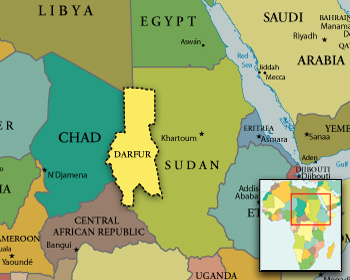Video
May 6, 2009 at 6:19 pm (Uncategorized)
5 Congress Members Arrested for Protesting Against the Crisis in Darfur
May 4, 2009 at 6:19 pm (Uncategorized)
Five Congress members were arrested on April 27, 2009 for civil disobedience after protesting against the crisis in Darfur in front of the Sudanese Embassy in Washington D.C.
Congress members Keith Ellison (D-Minn.), Jim McGovern (D-Mass.), Lynn Woolsey (D-Petaluma), John Lewis (D-Ga.) and Donna Edwards (D-Md.)- crossed a yellow police tape line and refused to leave the demonstration prior to their arrest.
The lawmakers were upset with Sudanese President Omar Hassan Ahmed Bashir’s decision to discontinue 16 nongovernmental aid organizations that could be vital in helping the crisis and urged him to reinstate the organizations. Bashir shut down these groups after the International Criminal Court issues a warrant for his arrest.
“I hope that is very clear to our administration and to international communities that violence in Darfur must end,” Woolsey said.
The protesters, along with three activists, were handcuffed by Secret Service officers and taken into custody by local police officers. They were released a few hours after paying a $100 fine.
Among the arrested activists was Jerry Fowler, the president of the Save Darfur Coalition.
Fowler said that in his travels to Darfur, he observed how critical the situation had become. “They are at a tremendous risk,” he said of the civilians.
Fowler also aimed his message towards President Obama, urging him to promote peace and pressure the international community to find a solution to the violence in Darfur. “American leadership can make a difference,” he said, “but it will take a tenacious and determined effort.”
In a written statement, Ellison said, “We implore all countries to demand that the government of Sudan respect and protect human rights and put an end to the acts of atrocities and crimes against humanity in Darfur.”
Source: The Los Angeles Times- www.latimes.com
What’s going on in Darfur ?
April 29, 2009 at 5:54 pm (Uncategorized)

The war in Darfur, an area of Sudan in Africa consists of tensions between two groups which have escalated to a seemingly endless cycle of terror, murder, and acts against humanity.
Origins:
The conflict originated due to tribal clashes over land and water rights between the nomadic tribes who consider themselves Arab and the non-Arab tribes, which consist of nomadic herders and farmers. The two groups have had traditional conflicts for years.
In February 2003, two non-Arab rebel groups attacked military targets to retaliate against what they felt was the government’s neglect and discrimination against them. These attacks sparked Arab-tribal fighters, who were allegedly rallied by the Sudanese government, to launch attacks against the non-Arab rebel groups.
The combination of these political struggles in addition to the increasing competition for fertile land resulted in what we know as the genocide by the Arab tribal fighters against the non-Arab citizens of Darfur.
Clash of the Cultures:
Janjaweed is a word used by non-Arabs to describe the Arab tribal fighters who fight for the government on horses and camels and engage in violent acts including murdering, raping, and displacing non-Arab civilians out of their homes. The Janjaweed often loot and burn the homes that make up the civilian villages of Darfur.
There is disagreement as to who operates the Janjaweed tribe behind the scenes. Although the Sudanese government denies any relations with the militia, leaders of the Janjaweed claim that the government asked the tribes for help in attacks against the rebel non-Arabs. Several members of the Janjaweed, however, deny that they answer to the government and instead claim they are lead by their individual tribal leaders.
The Zaghawa tribe mainly composes the non-Arab military called the Sudan Liberation Army, who fights against the Janjaweed for the protection of non-Arab nomadic herders and farmers.
Genocide:
The issue that fuels these conflicts is that both of these groups want an equal share of power and resources in Darfur, and both are accused of trying to overthrow the government.
The United States and United Nations consider this collaboration of conflicts and violent acts against humanity a genocide. They blame Sudan’s military and the Arab militia for organizing Sudanese warplane attacks on non-Arab villages in addition to ground raids.
In May 2006, the government signed a peace deal, but only one of the main rebel groups also signed. The rest of the groups continued their acts and the violence has since proceeded to increase.
Statistics:
Since the start of the conflict in 2003, there have been several different estimates by many sources regarding the death toll in Darfur.
According to the Coalition for International Justice, the average number of people that have been killed in Darfur is about 450,000.
In addition to these deaths, about 3,000,000 people have been displaced from their homes.
Sources: